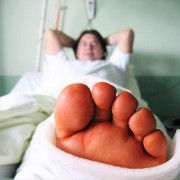 Photo: Getty Images
Photo: Getty Images
One of the most common problems associated with the aging process is osteoporosis. More than half of adults over the age of 50 will probably have to deal with this disease. If you are anxious about the possibility of osteoporosis affecting you, then keeping a steady eye on your bone health is a great preventative measure. This is because thinning bones are the precursor to osteoporosis, and if you know the warning signs now, you can possibly ward off the perils of weakened bones and multiple fractures later on in life. Here’s a quick peek into several warning signs that may alert you to thinning bones:
If you have sustained more than one fracture in the past couple of years, especially when associated with a seemingly negligible accident, this might be a sign that your bones are weak. If your bones are not strong enough to endure a minimal impact, they could be alerting you to potential problems in density.
If you are naturally thin or have a small frame, you have less bone to lose. Those with smaller frames are more likely to develop osteoporosis at a younger age than their larger-boned counterparts.
If you are currently taking prednisone or certain corticosteroids in response to an autoimmune disease, this can interfere with your hormone activity by draining calcium, vitamin D, and other essential nutrients from your bones. Studies have shown that those who have Crohn’s disease, rheumatoid arthritis, or lupus present with osteoporosis at an exceedingly higher rate than the average person because of the presence of and effects from the medicines used to treat their conditions.
Are you in the habit of lighting up? You may want to consider kicking the habit. While studies remain unclear as to exactly how smoking wreaks havoc on your bones, statistics show a very high correlation between this habit and osteoporosis.
Alcohol is another nasty culprit. If you drink more than two alcoholic drinks per day, you are subjecting your bones to the devastating effects that the alcohol will have on them as it leaches calcium, magnesium, and other important minerals from them.
Got milk? I sure hope so, as consuming milk is one of the best ways to build strong bones. Vitamin D, an ingredient in fortified milk, is highly essential to bone density. If you are lactose intolerant or just don’t drink milk for other reasons, you may want to consider soy or rice milk fortified with the essential nutrients or make sure you take a supplement that contains calcium, magnesium, and vitamin D. I will admit that I am not a milk drinker. Even as a child, I refused to drink it. Instead, I have always opted for calcium-rich foods and plenty of exercise to keep my bones strong and healthy. I also make sure to get adequate doses of sunshine for that vitamin D kick!
If you have struggled with an eating disorder, the low body weight associated with that lowers hormone levels, resulting in missed periods. When estrogen levels are lowered, that interferes with the bone building process.
Do you suffer from infrequent or irregular menstrual cycles? Low estrogen levels are typically at the root of this and play a contributing part in bone loss. In addition to being caused by an eating disorder or over-exercising, low estrogen can be caused by polycystic ovary disease.
If you have a first or second degree relative who developed osteoporosis before age 50 or prior to menopause, you are at an increased risk for weakened bones. Take a peek into your family history. Even if osteoporosis was never diagnosed, if there is a record of fractures, poor posture, or loss of height, osteoporosis was probably the reason.
What is your ethnicity? If you are Caucasian or Asian who is a female and over the age of 50, just one of those factors may or may not determine if you develop osteoporosis. If you identify with all three, your bones are at a much greater risk for sustaining fractures.
Even if you can identify with just one of these warning signs of thinning bones, it is advisable that you speak with your physician about your options and the best treatment methods for you. After all, you need those bones to fully support you, hopefully for many years to come!
Source:
http://www.caring.com/articles/health-issues-risk-for-bone-thinning






Add a CommentComments
There are no comments yet. Be the first one and get the conversation started!